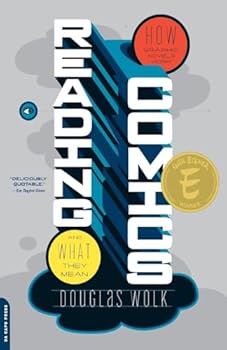Reading Comics: How Graphic Novels Work and What They Mean
Select Format
Select Condition 
Book Overview
Suddenly, comics are everywhere: a newly matured art form, filling bookshelves with brilliant, innovative work and shaping the ideas and images of the rest of contemporary culture. In Reading Comics,... This description may be from another edition of this product.
Format:Paperback
Language:English
ISBN:0306816164
Release Date:June 2008
Publisher:Da Capo Press
Length:405 Pages
Weight:1.14 lbs.
Dimensions:8.5" x 0.9" x 5.5"
Customer Reviews
5 ratings
Well written, informative, but title is misleading
Published by Thriftbooks.com User , 17 years ago
I'm a casual comic reader and bought this book to learn more about comic culture and classics. The author does a great job of talking about classic comics, authors, and illustrators. The first two chapters are also very interesting as they talk about the economics of comic distribution and how it has changed as more independent publishers have entered the market at various times in history. The last half of the book is made of reviews of prominent authors and illustrators. It's hard for me to read reviews of music, movies, or comics since 15 pages of prose about Will Eisner or Frank Miller isn't a substitute for just reading their works. Although they are very different, I would recommend buying Understanding Comics: The Invisible Art first, which does a much better job of explaining how comics work and what they mean. I would then read this book if you appreciate a prose-driven history of comics.
Better than Freud on Dreams.
Published by Thriftbooks.com User , 17 years ago
Want to know what your children are reading and what it means to them? Modern day graphic novels, what we used to call comic books, are all the rage and author Wolk interprets them even better than Freud on Dreams.
It's about damn time!
Published by Thriftbooks.com User , 17 years ago
This book has been a long time coming. In the big question regarding how comics can start getting talked about more seriously, the simplest answer is for people to actually just talk about them seriously. Douglas Wolk gets that started. While the first 1/3 may have an air of "well, duh" to long-time comics readers and professionals, it's still great to read how Wolk contextualizes the fundamentals, and many of his ideas may challenge you to consider why you have the conceptions about this artform that you have. Once the author starts dissecting other people's work, however, we're off to the races. Even books I didn't rate on my own or haven't read come alive when Wolk writes about them. He proves that comics aren't as simplistic as their reputation often implies, and as with any passionate critic, his enthusiasm is infectious.
smart, funny and informative
Published by Thriftbooks.com User , 17 years ago
Reading Comics is a wonderfully informative book that delivers on every level. It's fun to read b/c Douglas Wolk is a talented writer. He's smart and passionate and his understanding of comics/graphic novels is impressive. He's funny too, which doesn't hurt! I breezed right through it and really enjoyed the ride. He has a very conversational tone, but he's not your know-it-all friend who's pretending to know more than he does - he's just explaining everything to you the way a friend would, and I can't think of a better way to learn than that. I picked this up because I'm familiar with Wolk's work (his 33 1/3 on James Brown's Live at the Apollo is undeniably one of the best in the series) and was curious what he had to say about graphic novels and I recommend it to anyone in need of an intelligent book on the subject. It would be the coolest text book ever.
Satisfying...
Published by Thriftbooks.com User , 17 years ago
As a childhood comics fan returned to the medium as an adult in search of meaningful entertainment, I appreciated Wolk's book as timely for comics' present moment, perhaps even overdue. Few corners of American comics aren't discussed and none go unmentioned. Wolk's book provides adequately theoretical, satisfying discussions of both "mainstream" superhero comics and "art comics", mapping them in the constellation of American popular culture. It helps that Wolk is a music critic as well; Wolk writes accessibly, like a reviewer or critic, and is unapologetic about comics as pleasure-reading first, with enormous artistic potential behind them. He discusses a serious American comic fan's range of work in a thought-provoking manner (from Ware and Bechdel to Moore and Miller), but informs readers enough to avoid sounding like the snooty "you-haven't-read-that?" comics junkie expounding arcane comics references. Not perfect, but plenty good for a reader like me.






